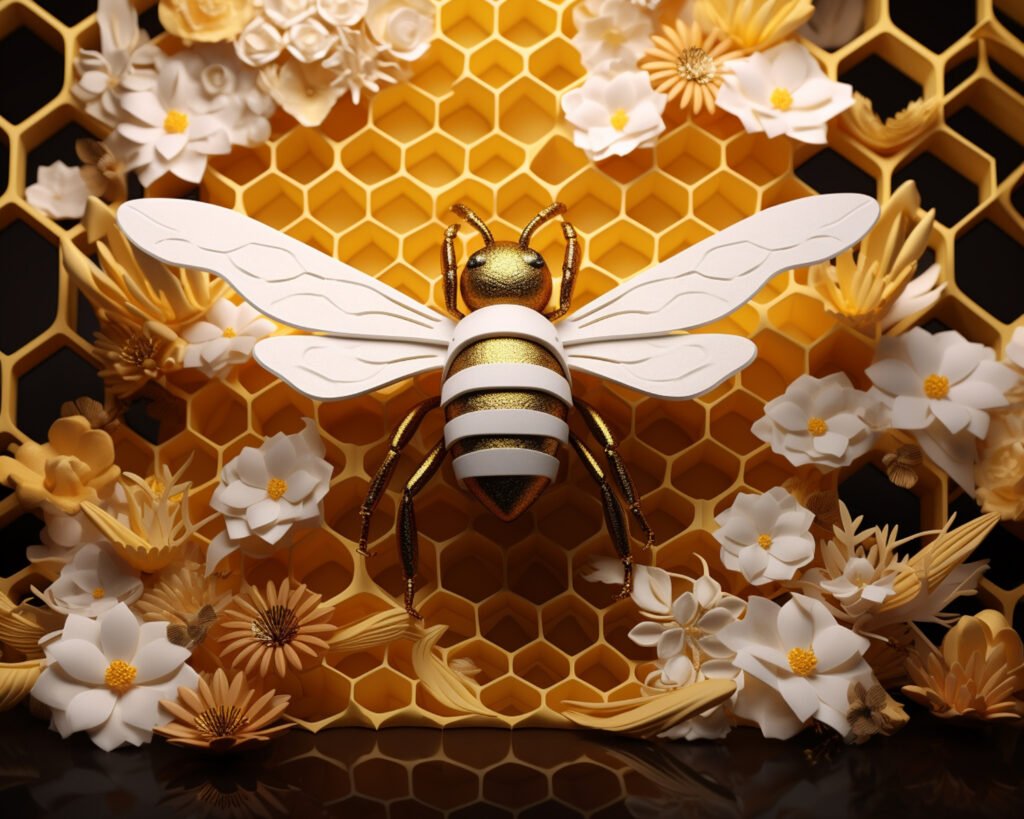Ever pondered why bears, those furry embodiments of nature’s whimsy, risk bee stings for a taste of honey? It’s not merely because the flavor is as mesmerizing as nature’s own version of a rock concert for the senses. Honey is more than just a bear’s guilty pleasure; it’s the golden thread in the tapestry of nature, weaving together flavor and function with every sticky, sweet drop. In the grand philosophical bazaar, honey is the currency of nature, exchanged between the flowers and bees in a buzzing economy of nectar. So, buckle up and prepare your taste buds (and your mind) for a journey through the sticky, sweet benefits of honey that go far beyond its delightful taste.

- 10 Benefits of Honey
- A Natural Energy Booster
- Supports Immune System
- Aids Digestion
- Soothes Coughs and Throat Irritation
- Beautiful Skin
- Potent Antioxidant
- Promotes Burn and Wound Healing
- Helps with Allergies
- Assists in Sleep
- Natural Sweetener
- 10 Facts about Honey
- Summary: The Golden Touch of Honey
- FAQ (Frequently Asked Questions About Honey)
- Is a spoonful of honey a day good for you?
- What does honey do to the body?
- Is honey good for the skin?
- Does honey clog pores?
- Does honey expire?
10 Benefits of Honey
A Natural Energy Booster
Step aside, energy drinks, and make room for nature’s very own quick fix for fatigue – honey! Just a spoonful packs a punch, providing a rapid energy boost. Its natural sugars, fructose and glucose, not only taste heavenly but are also absorbed quickly by your body, offering an instant revival of spirits and stamina. It’s the kind of natural pick-me-up that could make even a sloth consider a jog.
Supports Immune System
Honey acts like a loyal knight, guarding your health with its shield of antioxidants and antibacterial properties. These elements tirelessly combat viruses and bacteria, boosting your immune system and fortifying your body’s defenses. Regular doses of this golden nectar can help you fend off the common cold and make your immune system seem as invincible as a fortress.
Aids Digestion
Honey is a friend to your digestive system, caressing your gut with its soothing properties. Acting as an effective prebiotic, it feeds the beneficial bacteria in your intestines—those tireless workers essential for digestion and overall health. Think of honey as the nurturing food mother that keeps your gut flora thriving and your digestive woes at bay.
Soothes Coughs and Throat Irritation
Honey is the soothing whisper in the cacophony of cough and cold remedies. Its smooth, thick consistency coats the throat, calming irritation and silencing coughs with its natural sweetness. It’s a testament to nature’s gentle hand in healing, offering relief that’s as pleasant as its taste.
Beautiful Skin
Nature’s beauty secret, honey, is a treasure trove of antibacterial and moisturizing properties. When applied as a face mask, it combats acne, hydrates deeply, and leaves the skin glowing. Honey is not just food for the bees; it’s a golden elixir for radiant, youthful skin.
Potent Antioxidant
Loaded with powerful antioxidants, honey acts as your personal bodyguard against cellular damage caused by free radicals. These antioxidants help reduce the risk of chronic diseases and keep your body’s cells young and robust, protecting your health at the molecular level like a vigilant protector.
Promotes Burn and Wound Healing
Honey is not just a food item; it’s a medical marvel, proven to enhance the healing of wounds and burns. Its natural antibacterial properties prevent infection, while its soothing effect helps reduce inflammation and pain, speeding up the healing process like a gentle, nurturing nurse.
Helps with Allergies
By introducing small amounts of pollen through local honey, you can condition your immune system to handle seasonal allergens more effectively. Honey acts as a gentle trainer for your immune system, preparing it to deal with allergens without overreacting. Over time, this can lead to fewer seasonal allergy symptoms, making honey a sweet solution for sniffle season.
Assists in Sleep
In the symphony of sleep aids, honey is the gentle melody that can guide you to dreamland. Its ability to stimulate the release of serotonin and melatonin in the brain can help regulate sleep patterns, turning restless nights into peaceful slumbers. A spoonful before bed isn’t just a treat—it’s a ticket to better sleep.
Natural Sweetener
As a natural sweetener, honey sways with a rich tapestry of flavors that processed sugars can’t match. It offers a healthier alternative to refined sugar, sweetening your life without the spike in blood sugar levels. Its complex flavors enrich everything from yogurts and teas to baked goods, proving that sweetness can be nutritious and delicious.
10 Facts about Honey
- It takes about 55,000 flight miles and 2 million flower visits for bees to create one pound of honey.
- Honey has an eternal shelf life; archaeologists have unearthed 3000-year-old jars of honey from Egyptian tombs still fit for consumption.
- A single bee will produce only about one-twelfth of a teaspoon of honey in its lifetime, a testament to bee diligence and teamwork.
- The variety of flowers visited by bees influences the color and flavor of honey, making each batch a unique gustatory adventure.
- Medicinally, honey has been celebrated for over 5,000 years across various cultures, including ancient Egypt, Greece, and China.
- Honey contains all the essential ingredients to sustain life, including water, minerals, and vitamins.
- Bees perform a ‘waggle dance’ to communicate the location of flowers to their hive mates, a remarkable example of insect communication.
- Honey can naturally ferment to create mead, an ancient drink once known as the drink of the gods.
- Producing one pound of beeswax requires bees to consume about eight times as much honey by weight.
- Honey’s texture and consistency can change dramatically with temperature; it thickens and crystallizes in cold weather but returns to its liquid state when warmed.
Summary: The Golden Touch of Honey
In the grand symphony of natural foods, honey plays a leading role, not just as a simple condiment but as a powerhouse of nutritional and medicinal benefits. Each drop carries with it the essence of thousands of flowers and the tireless labor of countless bees. When you enjoy honey, you’re not just savoring a sweet treat; you’re dipping into a deep well of nature’s bounty. Honey isn’t just a food—it’s a golden miracle, enhancing everything it touches with a bit of its natural magic.
FAQ (Frequently Asked Questions About Honey)
Is a spoonful of honey a day good for you?
Partaking in a daily spoonful of honey can offer numerous potential health advantages. Honey boasts an array of antioxidants and possesses antimicrobial properties. It has been known to alleviate sore throats, serve as a natural cough suppressant, and aid in wound healing. However, it’s imperative to exercise moderation, as excessive honey consumption can contribute to caloric intake and impact blood sugar levels, particularly for individuals managing diabetes.
What does honey do to the body?
Honey exerts various positive effects on the body. Laden with antioxidants, it combats inflammation and shields cells from the detrimental effects of free radicals. Moreover, honey’s antimicrobial properties combat bacteria, bolstering the immune system. Additionally, it facilitates wound healing and alleviates digestive discomfort when consumed judiciously.
Is honey good for the skin?
Indeed, honey finds extensive use in skincare regimens and homemade remedies due to its moisturizing and antibacterial attributes. It effectively hydrates the skin, soothes irritation, and fosters healing for minor wounds or burns. Enzymes present in honey aid in gentle exfoliation, leaving the skin supple and smooth.
Does honey clog pores?
Pure honey typically does not instigate pore blockage. In fact, it’s often integrated into natural skincare routines owing to its non-comedogenic nature, which implies it’s unlikely to trigger acne or pore obstruction. Nonetheless, individuals with sensitive or acne-prone skin should conduct a patch test before applying honey directly to the face to preempt any adverse reactions.
Does honey expire?
Honey boasts an exceptionally lengthy shelf life and exhibits remarkable resistance to spoilage. Stored in a sealed container at room temperature, honey remains viable indefinitely. While it may crystallize or undergo texture changes over time, this doesn’t signify spoilage. Gentle warming can restore it to its liquid state. However, if honey develops an off odor, flavor, or appearance, it’s advisable to discard it.







